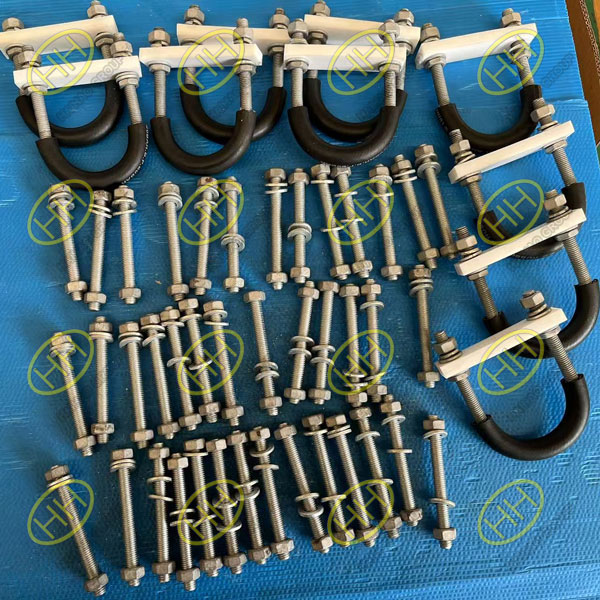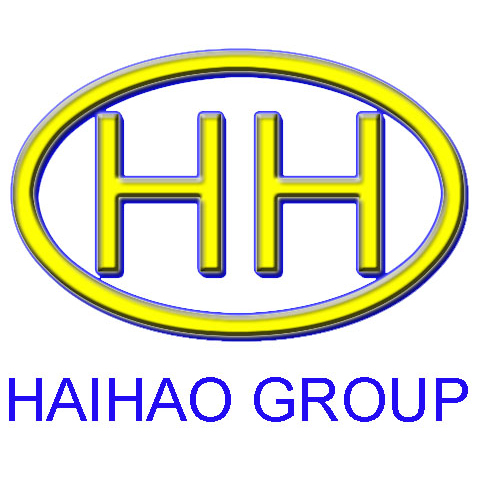ASTM A193 Gr.B7 Stud Bolts with A194 Gr.2H Nuts: High-Strength Fasteners for Industrial Applications
In the intricate world of industrial infrastructure, fasteners are far more than mere connecting pieces; they are critical components whose integrity directly impacts the safety, reliability, and operational lifespan of entire systems. Haihao Group recently completed a significant order for a long-term client in Côte d’Ivoire, supplying a comprehensive range of ASTM A193 Gr.B7 stud bolts paired with ASTM A194 Gr.2H heavy hex nuts and washers. These robust fasteners, enhanced with hot-dip galvanization (HDG) for superior corrosion resistance, are engineered to excel in the most challenging pipeline, pressure vessel, and structural applications globally. This article delves into the technical specifications, performance advantages, and critical selection considerations for these industry-standard high-strength fasteners, showcasing Haihao Group’s commitment to delivering unparalleled quality and reliability.
1. The Backbone of High-Pressure Systems: Understanding ASTM A193 Gr.B7 Stud Bolts
ASTM A193 Grade B7 is a foundational standard for high-strength alloy steel bolting materials used in high-pressure and high-temperature service. These stud bolts are specifically designed for applications where robust, secure, and durable connections are paramount.
1.1 Material Composition and Heat Treatment: The Science Behind Strength
The exceptional mechanical properties of A193 Gr.B7 bolts stem from their precisely controlled chromium-molybdenum (Cr-Mo) alloy steel composition and specialized heat treatment:
Chemical Composition (Typical Ranges):
Carbon (C): 0.38 – 0.48% (Provides hardness and strength)
Manganese (Mn): 0.75 – 1.00% (Enhances strength, hardenability, and toughness)
Phosphorus (P) & Sulfur (S): Max 0.035% (Kept low to ensure ductility and weldability)
Silicon (Si): 0.15 – 0.35% (Deoxidizer, improves strength)
Chromium (Cr): 0.80 – 1.10% (Boosts hardenability, corrosion resistance, and high-temperature strength)
Molybdenum (Mo): 0.15 – 0.25% (Crucial for high-temperature strength, creep resistance, and improved hardenability)
Quenched and Tempered (Q&T) Process: This critical heat treatment is what defines A193 Gr.B7’s performance. The steel is first quenched (rapidly cooled from high temperature) to form a hard, brittle martensitic structure. Subsequently, it undergoes tempering (reheating to a lower temperature and then slowly cooling) to increase ductility, toughness, and reduce internal stresses while maintaining high strength and hardness. This Q&T process results in a finely dispersed carbide structure that is highly resistant to deformation under extreme loads and temperatures.
1.2 Key Mechanical Properties for Demanding Service
The rigorous manufacturing and heat treatment of A193 Gr.B7 ensure a specific set of mechanical properties essential for industrial applications:
Tensile Strength: Minimum 125 ksi (860 MPa) – The ultimate strength a bolt can withstand before breaking under tension. Crucial for resisting pulling forces in a bolted joint.
Yield Strength: Minimum 105 ksi (725 MPa) – The point at which the bolt begins to deform permanently. Ensures the joint maintains integrity without permanent stretching under operational loads.
Hardness: Rockwell C35 maximum – A measure of resistance to indentation. Controlled hardness is vital for preventing brittle failure and ensuring compatibility with nuts.
Operating Temperature: Suitable for use up to 450°C (840°F) – This high-temperature resistance makes B7 bolts ideal for steam lines, heat exchangers, and other elevated-temperature processes where standard bolts would fail.
Impact Properties (Optional): For specific low-temperature applications, ASTM A193 allows for supplementary requirements for Charpy V-notch impact testing, which further confirms toughness.

ASTM A36 structural steel-bolts and nuts-pipeline products
1.3 ASTM A193 Gr.B7 vs. Other Common High-Strength Bolt Grades
Understanding the distinctions between various high-strength bolt grades is vital for correct application. While A193 Gr.B7 is optimized for high-temperature and pressure applications, other grades serve different primary purposes:
This comparison highlights why A193 Gr.B7 is the specialized choice for elevated temperature and pressure environments where A325 or A490 would be unsuitable.
2. The Essential Companion: ASTM A194 Gr.2H Heavy Hex Nuts & Washers
A high-strength bolt is only as effective as the nut that secures it. ASTM A194 Grade 2H heavy hex nuts are specifically designed to complement high-strength fasteners like A193 Gr.B7, ensuring the integrity of the bolted joint.
2.1 Material, Heat Treatment, and Matching Strength
Material: A194 Gr.2H nuts are manufactured from carbon steel, typically A194 Gr.1045 or similar grades, carefully chosen for their hardenability.
Heat Treatment: Similar to B7 bolts, Gr.2H nuts undergo a heat treatment process (quenching and tempering) to achieve their specified mechanical properties, particularly high hardness and proof load capacity. This ensures the nut can withstand the high stresses exerted by a tightened B7 bolt without stripping its threads or deforming.
Strength Matching: It is critical that the nut’s strength and proof load are equal to or greater than the bolt’s tensile strength. The A194 Gr.2H specification guarantees this compatibility, preventing thread stripping and ensuring the bolt breaks before the nut fails, a safer failure mode.
2.2 Heavy Hex Design: Enhanced Load Distribution and Wrenching
The “heavy hex” design is a defining characteristic of A194 Gr.2H nuts. Compared to standard hex nuts, heavy hex nuts feature:
Larger Bearing Surface: This increased contact area distributes the clamping force more effectively over the bolted joint surface, reducing the risk of embedment (indentation into the flange/material) and localized stress concentrations.
Larger Wrenching Surface: The wider flats provide a greater surface for wrenches, allowing for easier application of higher torque values (crucial for achieving proper preload in high-strength applications) and reducing the chance of rounding off the corners during tightening or loosening.
Improved Load Distribution: The design helps maintain preload under heavy loads and vibrations, significantly enhancing joint security and preventing loosening, which is vital in high-pressure or dynamic applications.
2.3 The Indispensable Role of Washers
Along with the bolts and nuts, washers are an integral part of a bolted joint. For high-strength applications like those using A193 Gr.B7 and A194 Gr.2H, flat washers (often to F436 specification) are typically used to:
Distribute Clamping Force Evenly: Preventing damage to the bolted surface and ensuring uniform stress distribution across the joint.
Prevent Embedment and Galling: Acting as a sacrificial layer between the rotating nut and the stationary surface, reducing friction and preventing scoring.
Bridge Oversized Holes: Accommodating slightly oversized bolt holes in components.
Provide a Smooth Bearing Surface: For accurate torque application, especially when using torque wrenches.
3. Corrosion Protection: Hot-Dip Galvanization (HDG) and Other High-Performance Coatings
In many industrial environments, particularly those exposed to weather, moisture, or corrosive agents, bare carbon steel fasteners are susceptible to rust and degradation. Corrosion protection is therefore a critical selection factor.
3.1 Hot-Dip Galvanization (HDG) Explained
Hot-dip galvanization (HDG) is a widely used and highly effective method for enhancing the corrosion resistance of steel fasteners. The process involves submerging the cleaned steel bolts and nuts into a bath of molten zinc. A metallurgical bond forms between the steel and the zinc, creating a highly durable, multi-layered zinc-iron alloy coating, topped with a pure zinc outer layer.
Dual Protection Mechanism:
Barrier Protection: The zinc coating acts as a physical barrier, preventing corrosive elements (oxygen, moisture) from reaching the underlying steel.
Cathodic Protection (Sacrificial Protection): If the coating is scratched or damaged, the zinc (being more electrochemically active than steel) sacrificially corrodes first, protecting the steel substrate.
Benefits: Excellent long-term corrosion resistance, especially in outdoor, marine, and humid environments. Cost-effective for large volumes.
Considerations for High-Strength Bolts (Hydrogen Embrittlement): For high-strength bolts like A193 Gr.B7 (which are susceptible), the HDG process must be carefully controlled to mitigate the risk of hydrogen embrittlement. This involves strict control over acid pickling time and temperature, followed by a mandatory post-galvanizing baking process (hydrogen de-embrittlement baking) to drive out absorbed hydrogen. Haihao Group rigorously adheres to these protocols and ensures compliance with ASTM A193/A153 requirements to guarantee the integrity of HDG Gr.B7 fasteners.
3.2 Comparison with Other Specialized Coatings
While HDG is robust, other coatings offer different advantages for specific applications:
4. Comprehensive Applications and Selection Criteria
The robust properties of A193 Gr.B7 stud bolts and A194 Gr.2H nuts make them indispensable across a wide spectrum of critical industrial applications.
4.1 Detailed Applications
Oil & Gas Pipelines: Securely bolting flanges in high-pressure, high-temperature oil and gas transmission lines, wellhead equipment, valve stations, and processing units, especially in corrosive environments (where coated).
Petrochemical & Power Plants: Essential for connections in pressure vessels, heat exchangers, reactors, steam turbines, boiler components, and high-temperature piping systems where integrity under extreme conditions is non-negotiable.
Structural Engineering: Providing strong, durable bolted connections for heavy steel structures, industrial supports, and machinery bases, particularly where high preload and resistance to shear/tensile forces are required.
Marine & Offshore Projects: Utilized in platforms, jetties, subsea equipment, and coastal facilities. Hot-dip galvanized bolts offer superior corrosion resistance crucial for longevity in saltwater and humid environments.
4.2 Key Factors for Selecting B7/2H Fasteners
Selecting the correct fasteners involves more than just matching thread sizes. Key considerations include:
Operating Temperature Range: Confirming the bolt’s suitability for the maximum and minimum temperatures of the application. For cryogenic service, alternatives like ASTM A320 Gr.L7 are required; for extremely high temperatures beyond 450°C, A193 Gr.B16 might be considered.
Pressure Rating of the Joint: Ensuring the fasteners’ strength matches or exceeds the pressure class of the flanges or components being joined.
Corrosion Environment: Assessing the corrosivity of the operating environment (e.g., atmospheric, marine, chemical exposure) to select the appropriate coating (HDG, PTFE, etc.).
Load Conditions: Static vs. dynamic loading, presence of vibration, and required preload for joint integrity.
Installation & Torque Requirements: Understanding proper tightening procedures, lubrication, and torque values to achieve the desired clamping force without overstressing the bolt or stripping the nut.
Compatibility with Mating Components: Ensuring the fasteners are compatible with the flange material (e.g., carbon steel, stainless steel) to prevent galvanic corrosion or galling.
5. Haihao Group: Your Trusted Partner for High-Strength Fasteners
With decades of profound experience in manufacturing and supplying pipeline system components, Haihao Group has solidified its position as a trusted global supplier of ASTM A193 Gr.B7 stud bolts with A194 Gr.2H nuts and a wide range of industrial fasteners. Our commitment goes beyond simply delivering products; we provide comprehensive solutions for your most demanding projects.
Unwavering Quality Assurance: Our A193 Gr.B7 stud bolts and A194 Gr.2H nuts comply with stringent ASME, ASTM (specifically A193, A194, F436), and ISO standards. We maintain a rigorous quality control system encompassing:
Full Material Traceability: From raw material melt to finished product.
Comprehensive Chemical & Mechanical Testing: Ensuring material composition and performance meet specifications.
Precise Dimensional & Thread Gauging: Guaranteeing accurate fit and preload capability.
Controlled Heat Treatment & Post-Galvanization Baking: Mitigating hydrogen embrittlement risks for HDG bolts.
Coating Adherence & Thickness Testing: Verifying corrosion protection.
Precision Manufacturing & Custom Solutions: We employ advanced manufacturing techniques, including precise thread rolling (for superior strength and fatigue resistance over cut threads) and cold heading. We offer custom coatings (including hot-dip galvanization and PTFE coating) and tailored packaging solutions to meet specific project requirements and ease installation.
Global Reach & Responsive Service: Our efficient global logistics network ensures fast and reliable delivery to meet urgent project timelines, as exemplified by our recent shipment to Côte d’Ivoire. Our dedicated sales and technical support teams provide expert consultation, assisting you from material selection to post-installation queries.
Looking for high-strength A193 Gr.B7 stud bolts with A194 2H nuts and washers for your industrial projects? Contact Haihao Group today for expert solutions! Email:sales@haihaogroup.com

